 Petzlover
Petzlover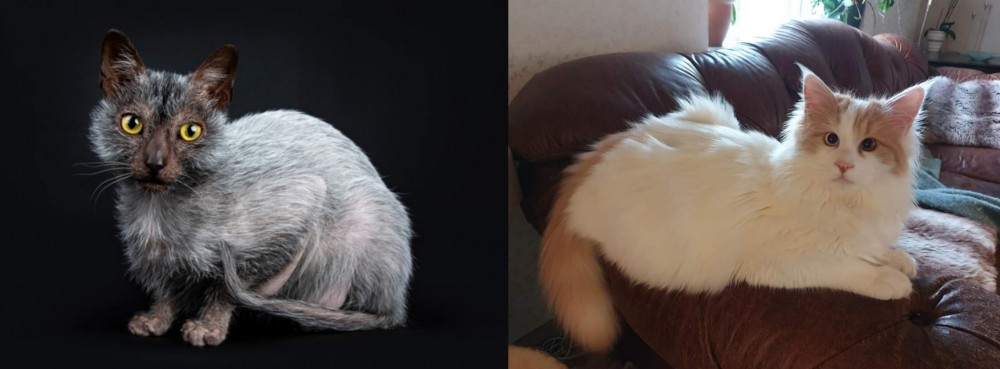 Lykoi is originated from United States but Turkish Van is originated from Turkey. Both Lykoi and Turkish Van are having almost same weight. Both Lykoi and Turkish Van has same life span. Both Lykoi and Turkish Van has same litter size. Lykoi requires Moderate Maintenance. But Turkish Van requires Low Maintenance
Lykoi is originated from United States but Turkish Van is originated from Turkey. Both Lykoi and Turkish Van are having almost same weight. Both Lykoi and Turkish Van has same life span. Both Lykoi and Turkish Van has same litter size. Lykoi requires Moderate Maintenance. But Turkish Van requires Low Maintenance
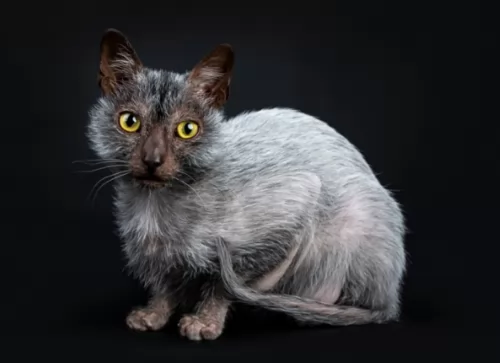 These cats were first discovered in 2010 in Virginia. It was Patti Thomas who named the breed Lykoi.
These cats were first discovered in 2010 in Virginia. It was Patti Thomas who named the breed Lykoi.
It was in 2012 that the cat breed went before the International Cat Association and is now recognized as a Championship Breed.
There is also work being done to expand the cat’s breeding program. It’s a naturally occurring gene in the feral cat population. There are still Lykoi cats born to the feral cat population.
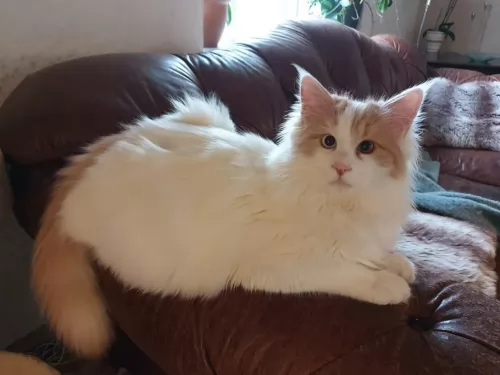 Hailing from Turkey, the Turkish Van was brought to the UK in 1955 by 2 British women, Laura Lushington and Sonia Halliday.
Hailing from Turkey, the Turkish Van was brought to the UK in 1955 by 2 British women, Laura Lushington and Sonia Halliday.
These cats were used as the foundation stock of the breed. They were brought to the United States in 1982 and accepted into championship with the Cat Fanciers’ Association in 1994.
They are a very rare breed and no other breed is allowed to be mixed into the cat's breeding schedule. All registered Turkish Van cats can have their ancestry traced back to the imported cats of Laura Lushington.
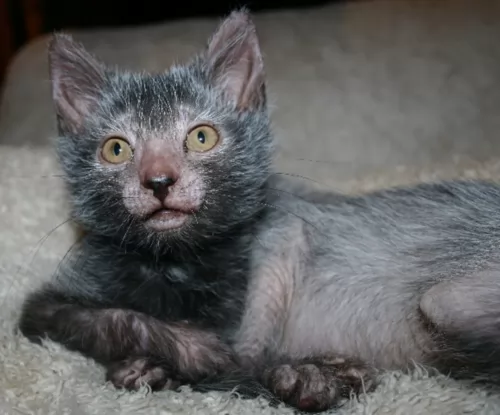 The Lykoi varies quite a bit in looks and you get some that are completely covered in hair and some that are actually partially hairless. Strangely, they are born with quite a lot of black fur.
The Lykoi varies quite a bit in looks and you get some that are completely covered in hair and some that are actually partially hairless. Strangely, they are born with quite a lot of black fur.
The cat has a solid black roan coat with no undercoat. Even though the cat is partially hairless, it molts a couple of times each year.
People are inclined to think that the little bit of hair would be wiry, when in fact it is soft and silky. It's just that it looks like bristles, but is actually not. People are always surprised by the coat's softness.
The Lykoi has a lean muscular body with large ears and eyes. He is a medium-sized cat and can weigh between 4 to 6kg.
The Lykoi is a friendly, people-oriented cat that is affectionate towards its human owners. This is also a playful cat breed and he is also intelligent and inquisitive.
The Lykoi is fond of his human family and makes a wonderful companion.
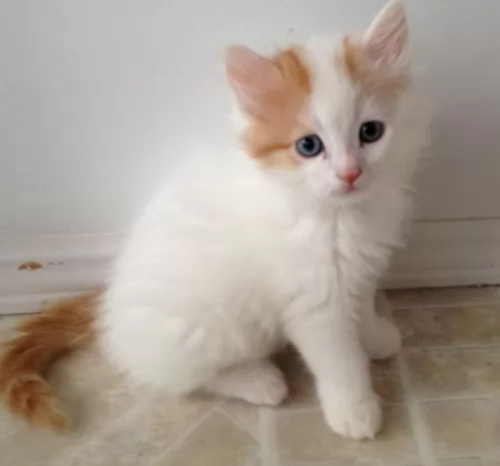 This is a medium to large-sized cat weighing roughly 3 to 8kg. It’s a semi-long-haired domestic cat breed that was actually developed in the United Kingdom with a selection of cats from Turkey.
This is a medium to large-sized cat weighing roughly 3 to 8kg. It’s a semi-long-haired domestic cat breed that was actually developed in the United Kingdom with a selection of cats from Turkey.
The breed is distinguished by the Van pattern where the color is restricted to the head and tail. So the cat is white with color on the head and the tail. The Turkish Van has no undercoat and the cat has a sleek appearance.
The cat is quite long and its back legs are slightly longer than its front legs. The paws are large and they are strong jumpers.
These cats are playful, active, and independent and they are also excellent hunters. They are affectionate and form strong bonds with their human families.
They get on well with kids as well as with other pets. Energetic and agile, they love to leap up onto high places. For a cat, they also have this fascination with water and may well follow their human into a swimming pool or lake.
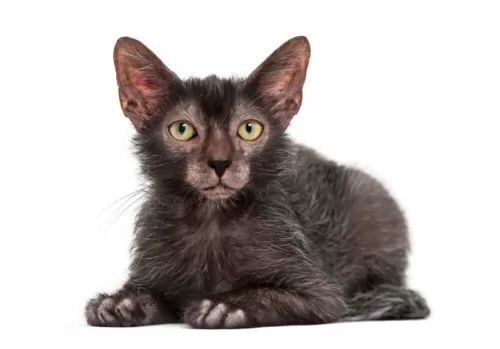 People who have owned the Lykoi say that they make a remarkable and devoted pet. They want a lot of attention and they’re willing to give attention as well.
People who have owned the Lykoi say that they make a remarkable and devoted pet. They want a lot of attention and they’re willing to give attention as well.
They’re social cats and want to spend time with their human companions. A cat that doesn’t receive the love and care it needs can become heartbroken and sick.
If you have one of these cats and your life has changed so that you can’t give it the attention it craves, at least provide it with a feline companion.
Cats aren’t all the aloof creatures they’re made out to be and your Lykoi is capable of making you a splendid companion.
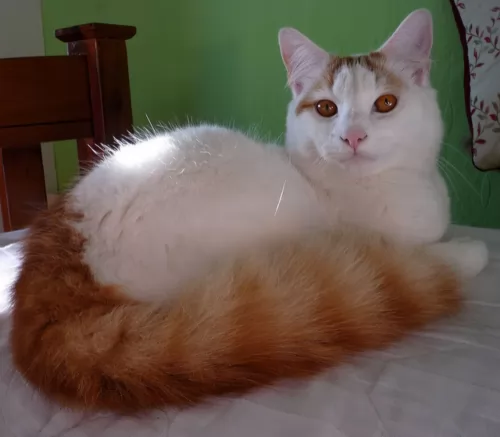 Lively, social, and intelligent, the Turkish Van is going to make you a wonderful pet and companion.
Lively, social, and intelligent, the Turkish Van is going to make you a wonderful pet and companion.
He is an active cat and will require you to play with him and provide some form of exercise for him.
He likes to leap up onto perches so getting him a climbing tree will serve him well as he is a cat that loves perching on high up places.
These cats are also low maintenance which simply adds to them being such perfect pets for single people, couples, families and seniors, just so long as he is provided with lots of love and care.
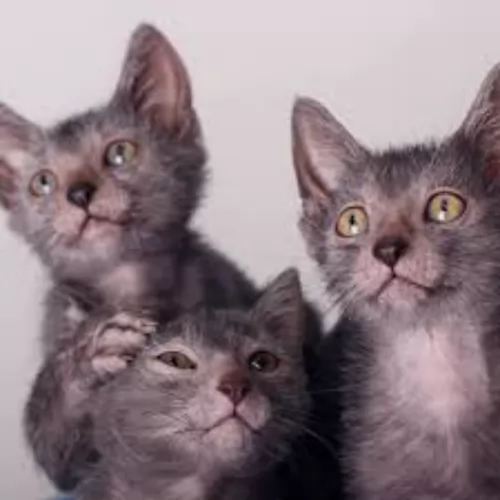 This cat is vulnerable to being cold and it should essentially be an indoor cat. If your Lykoi cat escapes, it can’t possibly keep warm on its own.
This cat is vulnerable to being cold and it should essentially be an indoor cat. If your Lykoi cat escapes, it can’t possibly keep warm on its own.
The Lykoi cat has not shown any specific health problems but being hairless, it is vulnerable to respiratory issues. Eye discharge as well as perpetual sneezing are characteristics of a cat with Feline Upper Respiratory Disease.
The cat’s mouth, sinuses, nasal passages, and upper airway are all affected. Your cat will need to get to the vet for a diagnosis and medical treatment. There are vaccines to prevent feline upper respiratory disease.
Any cat can develop this disease and your cat may have trouble breathing.
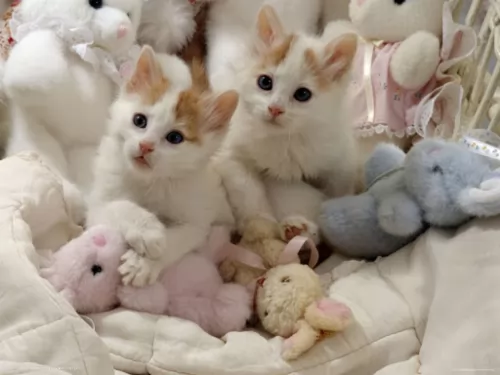 Your Turkish Van counts on you to ensure his health and wellbeing. This will ensure he lives a long and healthy life.
Your Turkish Van counts on you to ensure his health and wellbeing. This will ensure he lives a long and healthy life.
Obesity is a major disease that contributes to many illnesses in cats. Excess weight is one of the factors for the development of arthritis and diabetes as well as some life-threatening diseases.
All kinds of parasites can invade your Turkish Van’s body. . Many types of parasites can be detected with a fecal exam, so a trip to your vet may be necessary.
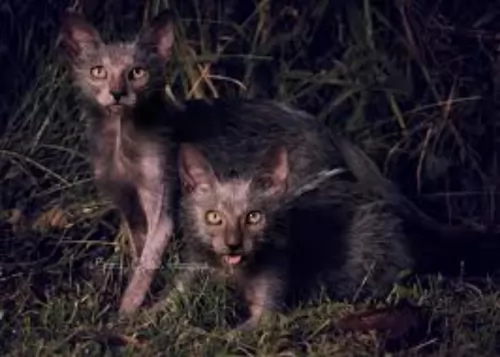 With the Lykoi’s lack of a coat, it isn’t going to require too much grooming. However, you have to keep a watch on this cat as without hair, he is vulnerable to sunburn and to getting cold.
With the Lykoi’s lack of a coat, it isn’t going to require too much grooming. However, you have to keep a watch on this cat as without hair, he is vulnerable to sunburn and to getting cold.
The cat has oily skin and it’s one cat breed that will need a bath occasionally. Some people recommend it once a week. Use warm water and a special pet shampoo recommended by your vet. Every trace of shampoo will need to be washed off to avoid the skin becoming irritated.
Provide your cat with food and water bowls, bedding, litter box, collar, grooming accessories and toys.
Cat food is a huge, important decision for any cat, as their very health depends on it. Commercially manufactured cat foods are available as wet and dry. Make sure you always get your cat food from a reliable source.
Some people believe in offering their cat both wet and dry options. Whatever you decide for your cat, remember that it needs to be at least 70% protein as every cat is a carnivore and requires a diet rich in protein.
If in any doubt, rather speak to your veterinarian and ensure that your Lykoi is getting the best food there is to promote good health. Always make sure that your cat has access to fresh cool water night and day.
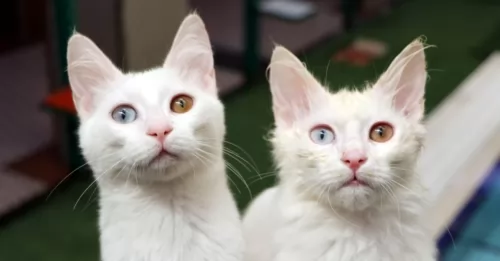 One of the most important things with a cat is diet. The cat is a carnivore. Watch his diet, and make sure he gets plenty of meaty food.
One of the most important things with a cat is diet. The cat is a carnivore. Watch his diet, and make sure he gets plenty of meaty food.
Check with your vet if you aren’t sure how to feed your cat. There must always be a constant supply of fresh, cool water available and both food and water bowls must be washed regularly.
Regularly brush your cat’s coat gently and at the same time check the body over for any unusual lumps. If you discover a new lump, get your cat to the vet.
Be sure to schedule in your cat’s vaccinations as without these your cat can die from some of the more dangerous ones.
Another wise move, if at all possible, is to sign up for pet health insurance as then you won’t dread it financially when your vet requests medical tests be done on your cat.
There are simple things you can do to ensure the longevity of your beloved cat. Good food, exercise, fresh water, and plenty of love and attention.
Turkish Vans can have problems with their teeth. Teeth brushing can be massively traumatic and uncomfortable for your pet, but the best diet and vet care will ensure healthy teeth.
Cats are meticulous about hygiene so ensure the litter box is kept clean. Remove the cat’s feces every single day.